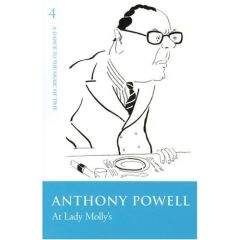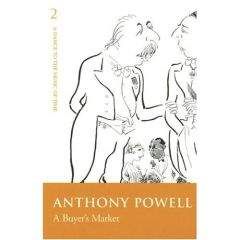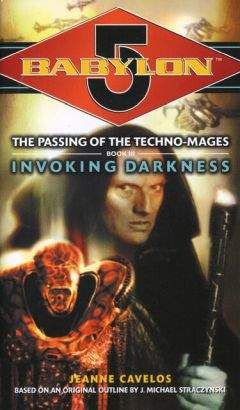Anthony Powell - At Lady Mollys
На сайте mybooks.club вы можете бесплатно читать книги онлайн без регистрации, включая Anthony Powell - At Lady Mollys. Жанр: Современная проза издательство неизвестно,. Доступна полная версия книги с кратким содержанием для предварительного ознакомления, аннотацией (предисловием), рецензиями от других читателей и их экспертным мнением.
Кроме того, на сайте mybooks.club вы найдете множество новинок, которые стоит прочитать.

Anthony Powell - At Lady Mollys краткое содержание
At Lady Mollys читать онлайн бесплатно
It appeared that no good idea had occurred either to Eleanor or Norah for inscription in the album.
‘I shall want it back soon,’ said Hopkins, ‘because another girl I know — such a little sweetie-pie with a little fragile face like a dear little dolly — is going to write some lovely lines in it. Shall I repeat to you what she is going to write? You will love it.’
Frederica Budd, who had been listening to all this with a slight smile, imperceptibly inclined her head, as one might when a clown enquires from his audience whether they have understood up to that point the course of the trick he is about to perform. Eleanor looked as if she did not particularly wish to hear what was offered, but regarded any demur as waste of time. Hopkins spoke the words:
‘Lips may be redder, and eyes more bright;
The face may be fairer you see tonight;
But never, love, while the stars shall shine,
Will you find a heart that is truer than mine.’
There was a pause when Hopkins came to the end of her recitation, which she had delivered with ardour. She struck an attitude, her hand on her hip.
‘Sweet, isn’t it?’ she said. ‘This friend of mine read it somewhere, and she memorised it — and so have I. I love it so much. That’s the sort of thing I want. I’ll leave the album a little longer then, girls, but remember — I shall expect something really nice when you do, both of you, think of a poem. Now what about that egg?’
Norah Tolland went into the kitchen of the flat. Hopkins stood grinning at us. No one spoke. Then Norah returned. On receiving the egg, Hopkins feigned to make it disappear up the sleeves of her shirt, the cuffs of which were joined by links of black and white enamel. Then, clenching her fist, she balanced the egg upon it at arm’s length, and marched out of the room chanting at the top of her voice:
‘Balls, Picnics and Parties,
Picnics, Parties and Balls …’
We heard the sound of her heavy, low-heeled shoes pounding the boards of the uncarpeted stairs, until at length a door slammed on a floor below, and the voice was cut off with a jerk.
‘She really plays the piano jolly well,’ said Norah.
It was a challenge, but the glove was not picked up.
‘Rather an amusing person,’ said Frederica. ‘Do you see much of her?’
‘She lives a couple of floors below,’ said Eleanor. ‘She is rather too fond of looking in at all hours.’
‘Oh, I don’t know,’ said Norah. ‘I like Heather.’
‘So you’ve made up your mind about Thrubworth?’ said Frederica, as if the merits of Hopkins were scarcely worth discussing.
I explained that I must now leave them. Frederica, at the moment of saying good-bye, spoke almost warmly; as if her conjecture that I might be a support to her had been somehow justified. Norah Tolland was curt. It was agreed that I should ring up Eleanor one of these days and come to see them again. I had the impression that my departure would be the signal for a renewed outbreak of family feuds. Anxious to avoid even their preliminary barrage, I descended the rickety, fœtid stairs, and proceeded on my way.
Later that evening, I found myself kicking my heels in one of those interminable cinema queues of which I have already spoken, paired off and stationary, as if life’s co-educational school, out in a ‘crocodile’, had come to a sudden standstill: that co-educational school of iron discipline, equally pitiless in pleasure and in pain. During the eternity of time that always precedes the termination of the ‘big picture’, I had even begun to wonder whether we should spend the rest of our days on that particular stretch of London pavement, when, at long last, just as rain had begun to fall, the portals of the auditorium burst open to void the patrons of the earlier performance. First came those scattered single figures, who, as if distraught by what they have seen and seeking to escape at whatever the cost, hurry blindly from the building, they care not how, nor where; then the long serpentine of spectators to whom expulsion into the street means no more than a need to take another decision in life; who, accordingly, postpone in the foyer any such irksome effort of the will by banding themselves into small, irregular, restless groups, sometimes static, sometimes ineffectively mobile. As the queue of which we formed a link stumbled forward towards the booking office, I discerned through the mist of faces that must dissolve before we could gain our seats, the features of J. G. Quiggin. Our eyes met. He shook his head sharply from side to side, as if to express satisfaction that we should run into each other in so opportune a manner. A moment later he was near enough to make his small, grating tones heard above the murmur of other voices.
‘I’ve been trying to get hold of you,’ he said.
‘We must meet.’
‘There were some things I wanted to talk about.’
Since we had been undergraduates together my friendship with Quiggin, moving up and down at different seasons, could have been plotted like a temperature chart. Sometimes we seemed on fairly good terms, sometimes on fairly bad terms; never with any very concrete reason for these improvements and deteriorations. However, if Quiggin thought it convenient to meet during a ‘bad’ period, he would always take steps to do so, having no false pride in this or any other aspect of his dealings with the world. After such a meeting, a ‘good’ period would set in; to be dissipated after a time by argument, disagreement or even by inanition. This periodicity of friendship and alienation had rotated, almost like the seasons of the year, until a year or two before: a time when Quiggin had ‘run away’ with Peter Templer’s wife, Mona. This act threatened to complicate more seriously any relationship that might exist between Quiggin and myself.
As things turned out, I had seen nothing either of Templer or Quiggin during the period immediately following the divorce. Templer had always been out or engaged when I had telephoned to him; and, as we had by then little left in common except having been friends at school, our intermittent meetings had entirely ceased. There was perhaps another reason why I feit unwilling to make more strenuous efforts to see him. He reminded me of Jean. That was an additional reason for allowing this course to prevail. I heard quite by chance that he had sold his Maidenhead house. It was said, whatever his inner feelings about losing Mona, that outwardly he was not taking things too hard: demonstrating a principle he had once expressed: ‘Women always think if they’ve knocked a man out, that they’ve knocked him out cold — on the contrary, he sometimes gets up again.’ However, no husband enjoys his wife leaving the house from one day to the next, especially with someone like Quiggin, in Templer’s eyes unthinkable as a rival. Quiggin, indeed, belonged to a form of life entirely separate from Templer’s, so that gossip on the subject of the divorce was exchanged within unconnected compartments; Templer’s City acquaintances on the one hand: on the other, the literary and political associates of Quiggin.
‘You are script-writing now, aren’t you?’ Quiggin asked, when we came within closer range of each other, and without any preliminary beating about the bush. ‘I want to have a talk with you about films.’
My first thought was that he hoped to get a similar job. To be a script-writer was at that period the ambition of almost everyone who could hold a pen. There was no reason why Quiggin should prove an exception to the rule. So far as I knew, he had to yet make the experiment. I noticed that he had almost discarded his North Country accent, or perhaps thought it inappropriate for use at that moment. In his university days, one of his chief social assets had been what Sillery used to call ‘Brother Quiggin’s Doric speech’. He looked well fed, and his squat form was enclosed in a bright blue suit and double-breasted waistcoat. He was hatless, such hair as remained to him carefully brushed. I had never before seen him look so spruce.
‘We’ve had a cottage lent us,’ he said. ‘I’d like you to come down for the week-end. Mona wants to see you again too.’
My first instinct was to make some excuse about weekends being difficult owing to the oppressive manner in which the film business was organised: in itself true enough. However, as it happened, an electricians’ strike had just been called at the Studio, with the result that work was likely to be suspended for at least a week or two. I was unwilling to seem to condone too easily the appropriation of an old friend’s wife; although it had to be admitted that Templer himself had never been over- squeamish about accepting, within in his own circle, such changes of partnership. Apart from such scruples, I knew enough of Quiggin to be sure that his cottage would be more than ordinarily uncomfortable. Nothing I had seen of Mona gave cause to reconsider this want of confidence in their combined domestic economy. It was generally supposed by then that they were married, although no one seemed to know for certain whether or not any ceremony had been performed.
‘Whereabouts is your cottage?’ I asked, playing for time.
The place turned out to be rather further afield than the destination of the usual week-end visit. While this conversation had been taking place, the queue had been moving forward, so that at that moment my own turn came at the booking office; simultaneously, the crowd behind Quiggin launched themselves on and outwards in a sudden violent movement that carried him bodily at their head, as if unwillingly leading a mob in a riot.
‘I’ll write the address to you,’ he bawled over his shoulder. ‘You must certainly come and stay.’
I nodded my head, fumbling with tickets and money. Almost immediately Quiggin, driven ahead by his seemingly fanatical followers, was forced through the doors and lost in the night.
‘Who was that?’ asked the girl accompanying me.
‘J. G. Quiggin.’
‘The critic?’
‘Yes.’
‘I think he has gone off rather lately.’
‘I expect he goes up and down like the rest of us.’
‘Don’t be so philosophical,’ she said. ‘I can’t bear it.’
We passed into the darkness and Man of Aran.
3
CURIOSITY, which makes the world go round, brought me in the end to accept Quiggin’s invitation. There was, indeed, some slight mystery about its origin, for after our last meeting — late one evening in the days before he had gone off with Mona — there had been disagreement between us either about Milton as a poet, or (various writers had been discussed) Meredith as a novelist, as a result of which I thought myself finally in disgrace. Of recent years, so everyone agreed, Quiggin had become increasingly dogmatic on such subjects, unable to bear contradiction, and almost equally offended by verbal evasion that sought to conceal views differing from his own. Although publication of his long-promised work, Unburnt Boats, had been once more at the last moment postponed, Quiggin’s occasional writings were at this time much in evidence. The subject matter of Unburnt Boats, thought to be largely autobiographical, remained, in spite of a good deal of speculation on the part of his friends, a closely guarded secret. His journalism was chiefly contributed to papers in which politics and literature attempted some fusion; and letters signed by him appeared with regularity in the ‘weeklies’ on the subject of public liberties or unworthy conduct on the part of the police. In private, Quiggin considered that there was too much freedom in modern life; but he was a great champion of individual liberty in his letters to the Press.
Accustomed, like so many literary men of that decade, to describe himself as a communist, he may indeed have been a member of the Communist Party. Later, at different stages of his career, he disseminated such contradictory statements on the subject of his own political history that card-holding membership remains uncertain. Most of his acquaintances inclined to think that at one moment or another he had belonged to some not very distinguished grade of the communist hierarchy. Certainly he pertained to the extreme Left and subscribed to several ‘anti-fascist’ organisations. He himself tended to cloak his political activities in mystery in so far as they took practical form: occasionally hinting that these activities might be more important, even more sinister, than persons like myself supposed.
‘The Lewis gun may be sounding at the barricades earlier than some of your Laodicean friends think,’ he had announced in a rasping undertone at the climax of our controversy about Milton — or Meredith.
‘I can never remember what the Laodiceans did.’
‘They were “neither hot nor cold”.’
‘Ah.’
Such revolutionary sentiments, as I have said, were common enough then, especially in the verse of the period, on which Quiggin was an authority. However, he had seemed rather unusually annoyed that evening, so that in spite of his friendliness in the foyer of the cinema I was not at all sure what sort of a reception I should get when I arrived on his doorstep. I went by train, and found a taxi had been sent to meet me at the station. We drove a mile or two through pretty country and by the low stone wall of a large estate. Quiggin was living in a small, grey, comparatively modern house, hardly a cottage in the sense that comes immediately to the mind — the cottage in a forest inhabited by a peasant in a fairy story, or the gabled, half-timbered sort of the Christmas card by which a robin sits in the snow — but, although the building itself was bleak, the situation was pleasant enough, in fact enchanting: overlooking woods, fields and distant hills, not another house in sight.
Quiggin was in a mood to be agreeable. When he set out to please, he was rarely unable to keep the most unpromising people amused; or at least quiet. He would assume his North Country accent, together with an air of informed simplicity, that would charm all kind of unexpected persons, normally in hearty disagreement with his literary or political opinions. He was particularly accomplished at effecting a reversal of feeling in the case of those who, on introduction, had taken an immediate dislike to his face or his clothes. Probably with that end in view, he cultivated a certain irregularity of dress. For example, when he opened the door on my arrival he was wearing a dark-grey woollen garment with a zip-fastener down the front, which, in conjunction with rope-soled canvas shoes, made him look like an instructor in some unusual sport or physical exercise.
‘Come in,’ he said, ‘Mona is blonding her hair. She will be along soon.’
Mona’s hair had been black in the days when I had first set eyes on her at Mr. Deacon’s birthday party above the antique shop off Charlotte Street, but, even before she had married Templer — when her Cupid’s bow mouth was still advertising toothpaste on the hoardings — it had already taken on a metallic honey colour. She looked distinctly sluttish when at length she appeared, far less trim than when married to Templer, a reversion to the Charlotte Street period when she had been an artists’ model. However, she had not returned to the style of dress of her bohemian days, trousers and sandals or whatever was then the fashion. Instead, wearing an old black coat and skirt, an outfit not much suited to the country, she retained a kind of shabby smartness of appearance. I had not seen her for some time, and had forgotten the formal perfection of her face. Her skin was coarse, it was true, and her fixed smile recalled the days when her photograph was on the front of every London bus; yet, even admitting such defects, the detail of every feature insisted upon admiration. She was like a strapping statue, Venus conceived at a period when more than a touch of vulgarity had found its way into classical sculpture.
Похожие книги на "At Lady Mollys", Anthony Powell
Anthony Powell читать все книги автора по порядку
Anthony Powell - все книги автора в одном месте читать по порядку полные версии на сайте онлайн библиотеки mybooks.club.



